Naming transition metals - Study guides, Class notes & Summaries
Looking for the best study guides, study notes and summaries about Naming transition metals? On this page you'll find 30 study documents about Naming transition metals.
Page 2 out of 30 results
Sort by
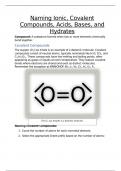
-
Mastering Chemical Compounds: A Student’s Guide to Naming and Understanding Bonds
- Class notes • 7 pages • 2024
- Available in package deal
-
- $5.48
- + learn more
This document breaks down the basics of naming and understanding different types of chemical compounds, perfect for high school students getting into chemistry. You'll learn how to identify and name covalent and ionic compounds, acids, bases, and hydrates. It covers everything from the elements involved, to how they bond, and the special rules for naming them—like using Greek prefixes for covalent compounds or Roman numerals for transition metals. Whether you're dealing with simple salts lik...
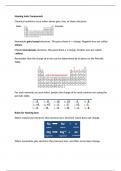
-
Naming Ionic Compounds: Guidelines and Practice
- Class notes • 4 pages • 2024
-
- $10.19
- + learn more
The document provides a guide for naming ionic compounds and understanding the roles of ions in chemical reactions. It outlines how to name ionic compounds, including the steps for identifying and naming metal and nonmetal ions, using prefixes, and dealing with polyatomic ions. It also provides guidance on determining formulas from names and emphasizes the importance of understanding the charges of transition metals and the use of suffixes to differentiate between types of ions.
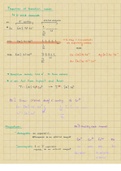
-
Class notes Chemistry (CHEM1062)
- Class notes • 10 pages • 2022
- Available in package deal
-
- $7.99
- + learn more
Dr. Pelton's transition metal lecture notes with worked-out examples and explanations of names.
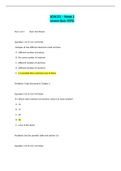
-
SCIN131 – Week 2 Lesson Quiz (92%)
- Exam (elaborations) • 11 pages • 2022
-
- $14.49
- + learn more
SCIN131 – Week 2 Lesson Quiz (92%) Part 1 of 3 - 36.0/ 40.0 Points Question 1 of 25 4.0/ 4.0 Points `Isotopes of two different elements could not have A. different number of protons. B. the same number of neutrons C. different number of electrons D. different number of neutrons E. it is possible they could have any of these Feedback: Topic discussed in Chapter 2 Question 2 of 25 4.0/ 4.0 Points `If a silicon atom contains 16 neutrons, what is it...
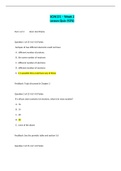
-
SCIN131 – Week 2 Lesson Quiz (92%)
- Exam (elaborations) • 11 pages • 2022
-
- $14.49
- + learn more
SCIN131 – Week 2 Lesson Quiz (92%) Part 1 of 3 - 36.0/ 40.0 Points Question 1 of 25 4.0/ 4.0 Points `Isotopes of two different elements could not have A. different number of protons. B. the same number of neutrons C. different number of electrons D. different number of neutrons E. it is possible they could have any of these Feedback: Topic discussed in Chapter 2 Question 2 of 25 4.0/ 4.0 Points `If a silicon atom contains 16 neutrons, what is it...
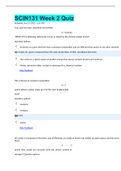
-
American Military University SCIN 131 Week 2 quiz / SCIN131 Week 2 Quiz > 94 / 100 - 94 %
- Exam (elaborations) • 15 pages • 2021
-
- $17.49
- 1x sold
- + learn more
SCIN131 Week 2 Quiz Released: Jun 25, 2021 11:55 PM Your quiz has been submitted successfully. 3 / 3 points `Which of the following statements is true as stated by the chemist Joseph proust? Question options: All atoms of a given element have a constant composition and are different than atoms of any other element. The nucleus is a dense region of positive charge that always contains protons and neutrons. Matter cannot be either created or destroyed in a chemical reaction. Hide Fe...
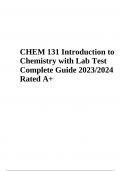
-
Introduction to Chemistry with Lab Test (CHEM 131 ) Guide 2023 Rated A+
- Exam (elaborations) • 74 pages • 2023
-
- $25.49
- + learn more
Introduction to Chemistry with Lab Test (CHEM 131 ) Guide 2023 Rated A+. Given the sequence of temps below, which one represents the Fahrenheit boiling, room temp, and freezing points of water, in that order? A.0-75-100 B.212-75-32 C.0-25-100 D.0-298-373 E.none of the above Answer Key: B Question 7 of 12 0.0/ 4.0 Points `How should someone classify grape juice? A.mixture-homogeneous B.pure substance-compound C.mixture-heterogeneous D.pure substance-element E.none of the above Ans...
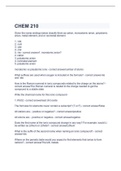
-
CHEM 210 2023 with complete solution
- Exam (elaborations) • 3 pages • 2023
-
- $10.99
- + learn more
Given the name endings below classify them as cation, monoatomic anion, polyatomic anion, metal element, and or nonmetal element 1. -ide 2. -ium 3. -ate 4. -ine 5. -ite 1. monatomic anion? 2. cation 3. polyatomic anion 4. nonmetal element 5. polyatomic anion monatomic vs polyatomic ions number of atoms What suffixes are used when oxygen is included in the formula? -ite and -ate How is the Roman numeral in ionic compounds related to the charge on the atoms? The...
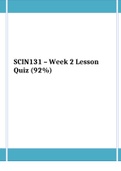
-
SCIN131 – Week 2 Lesson Quiz (92%)
- Exam (elaborations) • 12 pages • 2023
-
- $9.49
- + learn more
SCIN131 – Week 2 Lesson Quiz (92%) SCIN131 – Week 2 Lesson Quiz (92%) Part 1 of 3 - 36.0/ 40.0 Points Question 1 of 25 4.0/ 4.0 Points `Isotopes of two different elements could not have A. different number of protons. B. the same number of neutrons C. different number of electrons D. different number of neutrons E. it is possible they could have any of these Feedback: Topic discussed in Chapter 2 Question 2 of 25 4.0/ 4.0 Poi...
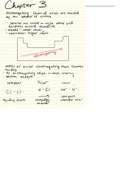
-
Class notes CHEM100 (CHEM100)
- Class notes • 8 pages • 2023
- Available in package deal
-
- $7.99
- + learn more
Chapter 3 lecture notes chem 100

$6.50 for your textbook summary multiplied by 100 fellow students... Do the math: that's a lot of money! Don't be a thief of your own wallet and start uploading yours now. Discover all about earning on Stuvia


